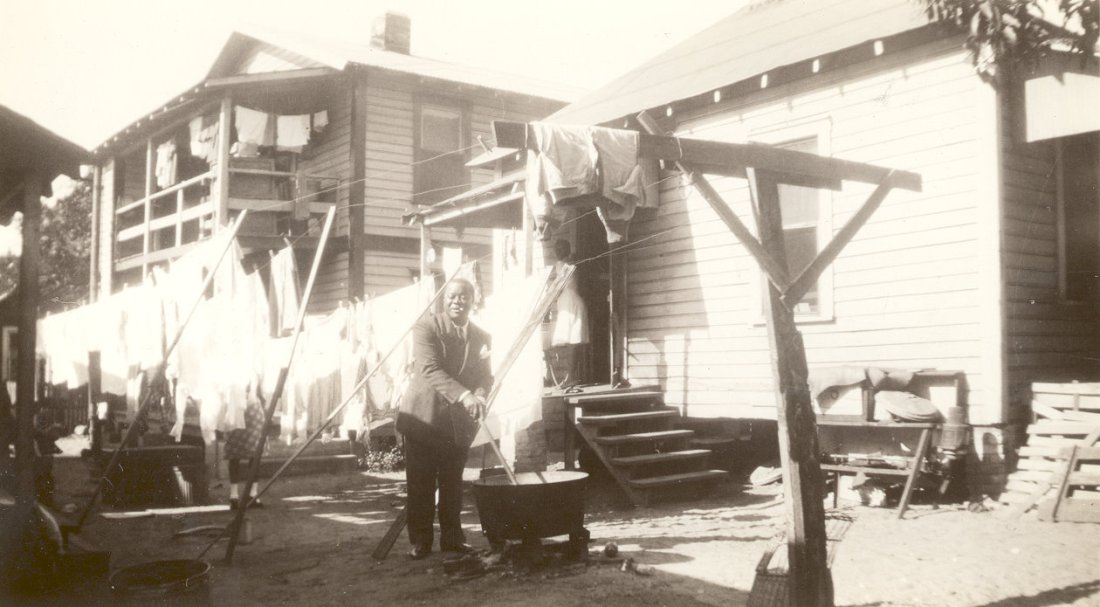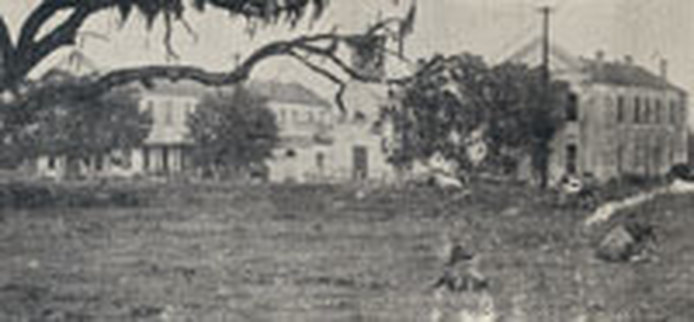|
In his biography of him, James Lincoln Collier writes,”…Louis Armstrong was one of the most important figures of 20th century music. Indeed, a case can be made for the thesis that he was the most important of them all, for almost single-handedly he remodeled jazz and, as a consequence, had a critical effect on the kinds of music that came out of it: rock and its variants; the music of television, the movies, the theater; the tunes that lap endlessly at our ears in supermarkets, elevators, factories, offices; even the “classical” music of Copland, Milhaud, Poulenc, Honegger, and others. Without Armstrong none of this would be as it is [emphasis added]. Louis Armstrong was the preeminent musical genius of his era.”[1] That is why Louis Armstrong matters. But I'd be willing to bet that relatively few today have any real appreciation for the fundamental and profound influence this man has had on American popular music since the 1920's. That influence was widely recognized during the Swing Era, and even into the 1950’s, but not so much today I think - primarily because the passage of time inexorably results in the fading of such memories and awareness. Yes, Louis Armstrong was a genius. An often overused term to be sure, but clearly not in this case. Jazz critic Stanley Crouch once observed that virtually every contemporary pop and jazz vocalist has been influenced by Louis Armstrong, whether they realize it or not. From the 1920's onward, he simply changed forever the style in which American popular songs were sung. An astounding fact, given that his virtuosity was always associated with his cornet, and later trumpet. Louis Armstrong was most likely born in 1897 or 1898 (not 1900, as is often reported) on Jane Alley in New Orleans. He spent most of his youth living at 1233 Perdido Street in the black section of Storyville, in abject poverty. He lived on the same block as the Union Sons' Hall (otherwise known locally as the more accurately described Funky Butt Hall), where the legendary cornetist Buddy Bolden played. Louis remembered listening to Bolden as a small child. In fact, one of Bolden’s most famous numbers, apparently composed by his valve trombonist Willy Cornish, was entitled, “Funky Butt,” later renamed, “Buddy Bolden’s Blues.” It appears that Louis’ father, Willie Armstrong abandoned his wife Mayann either shortly before, or immediately after Louis’ birth, to be with another woman and raise a separate family. He did not appear to be an irresponsible man however, as he worked for the same employer for over 30 years in New Orleans, and attained a modest degree of respectability in the community, remaining with the other woman and providing for this family. Nonetheless, the abandonment by his father left a permanent scar that remained with him until his death. Louis’ mother Mayann also left Jane Alley to relocate to Perdido Street in Storyville when he was an infant. As a result, Louis was mostly raised by his paternal grandmother, Josephine Armstrong, who had been born into slavery in 1858, during his first years. But Louis’ and his mother always retained a strong bond of affection up until her death in 1927. Louis Armstrong makes a return visit to his childhood home in New Orleans. Date unknown, but probably sometime in the late 1930's or 1940's. The neighborhood in Storyville at this time was described as consisting of honky-tonks; dance halls; brothels and saloons; a few churches and grocery stores; and rows of cheap housing, called ‘cribs.’ Music was everywhere, in the form of popular tunes of the day; marches; ragtime; blues; and even plantation songs. Louis Armstrong’s first musical experience was not with the cornet or trumpet, but rather when he formed a vocal quartet and sang on street corners for pennies to help with the family income. During the 1912 New Year's Eve celebrations in New Orleans, he fired a .38 caliber pistol with a live round in it at another youngster who had previously fired a gun at him with a blank cartridge. He was promptly arrested, and on January 2nd was sent to the Colored Waifs' Home run by former soldier Joseph Jones and his wife Manuella, to serve an indeterminate sentence. The Colored Waifs' Home at 301 City Park Avenue in New Orleans circa 1910, to which Louis Armstrong was remanded after 'the pistol incident' on New Year's Eve in 1912. It was at the Waifs' Home where he was given his first musical instrument.... a tambourine! He could not initially read music, and began to learn at the Home. He was later given an Eb alto horn to play, then ultimately a cornet - where his musical aptitude became readily apparent, and he learned music and musicianship under the leadership of Peter Davis. By the time he was released from the Waifs' Home, after approximately two years, he was leading the brass band with the other youngsters who were also affiliated with that facility. After working odd jobs in New Orleans and further developing his craft on the cornet, he ultimately made the transition to becoming a full-time musician in 1918, and remained as such for the rest of his life. Shortly thereafter, he left New Orleans for Chicago, where he was mentored and sponsored by Joe Oliver. Despite such inauspicious beginnings, he went on to have a profound impact on the development of American jazz and blues in a way that ultimately brought incalculable joy and comfort to the entire world throughout the 20th century. The music absolutely would not have been anywhere near the same - or as good - without his influence. By the 1920’s, his genius was already evident. And the seminal, definitive example during his Hot Fives and Hot Sevens period would of course be, “West End Blues,” written by Joe Oliver and recorded by Armstrong on June 28, 1928. You really have to listen to what other popular was sounding like in 1928 to truly appreciate just how amazing, and even revolutionary, this recording was. The first of Louis Armstrong's recordings of West End Blues, made on June 28, 1928 for the Okeh record label. The personnel included Louis on cornet; Earl Hines on piano; Jimmy Strong on clarinet; trombonist Fred Robinson; Mancy Carr on banjo; and Zutty Singleton on drums. From his unaccompanied cadenza opening to his scat vocals to his 4-bar high Bb, it’s instructive to keep in mind how different this was from how everyone else was playing and singing at that time, and more importantly, how it proceeded in a direction that virtually everyone else was going to follow. Perhaps Artie Shaw biographer Tom Nolan illustrates the point best in, “Three Chords for Beauty’s Sake,” in describing Shaw’s reaction to hearing Louis Armstrong for the first time on some Hot Fives records he found in a Cleveland warehouse: “’I couldn’t believe my ears [Shaw said]. No one had done that on a trumpet, before him. No one knows how he got to that. I didn’t understand that, and I still don’t.’ With Armstrong’s West End Blues, Shaw said, ‘I began to see vistas in music, in popular or in jazz playing, that I had not even imagined or conceived of.’”[2] More specifically, Shaw thought that, “Armstrong brought ‘swing’ to the fore: that rhythmic feel that marked what was jazz and what wasn’t. The rhythms and patterns that poured from his horn showed the way to the future….”[3] So by the early 1930’s, through the 1940’s and even into the 1950’s and ‘60’s, those rhythms and styles, with the smooth, forward rhythmic propulsion pioneered by Louis Armstrong that characterizes ‘swing;’ had permeated virtually all of American popular music. Nicely exemplified below even in a blues ballad performed by Louis and Billie Holiday entitled, The Blues are Brewin’, from the 1947 film, “New Orleans.” ____________________________ [1] James Lincoln Collier, Louis Armstrong: An American Genius (New York: Oxford University Press, 1983) p.3 [2] Tom Nolan, Three Chords for Beauty’s Sake (New York: W. W. Norton & Company, 2010) p.25. [3] Ibid. Louis Armstrong and Billie Holiday together in The Blues Are Brewin' from the 1947 United Artists film entitled, "New Orleans." A later example below of Louis Armstrong's improvisational skills while appearing on the Colgate Comedy Hour in 1952. Here he's playing Bugle Call Rag to awaken the troops in place of Reveille during a skit. Louis Armstrong makes a guest appearance on NBC's Colgate Comedy Hour on June 28, 1952 hosted by Bud Abbott and Lou Costello. A fine example of his improvisational skills, and his sharp attack on cornet that he first learned at the Waifs' Home in New Orleans, giving his horn its distinctive sound.
And so, Pops - thank you. Thanks for showing us how to live our lives, no matter our life circumstances or what happens to us. Thank you for sharing your musical genius to bring joy, to inspire, and to uplift the spirits of millions, worldwide. Thank you for always sharing a smile, a laugh, and the music that came from your heart. And thank you for your eternal optimism when you had every right to be bitter and to give up. Thank you for resisting the political and cultural cynicism that is now consuming the rest of us. The world’s a better place for the time you spent in it. What a wonderful world.
© 2017 David Nogar All Rights Reserved
2 Comments
Here's hoping all of you had a very Merry Christmas, Happy Hanukkah and a Fun New Year. In reflecting upon this past year, I realize that I've come across quite a few people during the course of my flaneurie for whom 2016 could simply not end soon enough. Whether it be due to personal issues, the passing of seemingly so many well-know people this year, the current political state of the world, or a combination of all three factors, I have found many walking around in a state of zombie-like shock or depression.
I followed the principles of American flaneurie that I outlined back in March of last year, and I can tell you that the people I either met or brought back into my life over the past year have changed it forever - all in an absolutely wonderful and personal way. Each person, whether they be writers, bloggers, co-workers, bartenders, aspiring actors, fellow commuters, old friends or even Goddaughters - all brought their own unique qualities and richness that have blessed me immeasurably. I only hope that I have been able to return some of those blessings in some small way.
And so 2016 has certainly not been perfect. I wanted to retire to devote my full-time to writing and the study of music and dance - and I could not. I wanted to travel more than I did, and I was not able. And the state of the world is not the best. But I did try to be a rigorous engager with all of those around me during the course of my daily life, and I was rewarded in ways I could not imagine. 2016 has given me new relationships that will hopefully last for the rest of my life. So I look forwarded to building on what I started in 2016, living 2017 to its fullest, with as pure a heart as I can muster, and resolving to wasting as little precious time as I have left, to living the life of an American flâneur. I'll be sharing my experiences here throughout the year. I hope you'll continue to join me. Happy 2017 everyone! © 2017 David Nogar All Rights Reserved |
Author
David Nogar worked in railroad operations for almost 50 years until retiring from the transportation business in early 2023.
|



 RSS Feed
RSS Feed